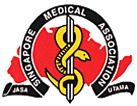
THESMANEWS
Present Issue
Past Issues
Journals
Present Issue
Past Issues
Letters to the Editor

![]()
This site is supported by Health ONE
Medical Training
Dr Chen Ai Ju, Director of Medical Services, in her opening address at the 9th year the SGH Annual Scientific Meeting, spoke of two specific areas that the profession must be acquainted with. These are quality of care and medical training. We have published part of her address on medical training in this issue. Her address on quality of care will be published in the June issue of the SMA News.
"A good education is given not just to impart knowledge and facts, but also to enable the students to acquire the skills and cultivate the habit of continuous learning for the rest of their lives. Merely memorising facts would only help one to pass examinations but very soon, these facts would be outdated and become invalid, especially in view of the rapid development of medical sciences. The Ministry is strengthening medical training and teaching in all public hospitals and institutions. The Associate Deans’ Scheme in public hospitals will be launched soon to strengthen undergraduate and postgraduate medical training programmes in our teaching hospitals and institutions. The scheme will help to ensure that proper training programmes are established, and that both the trainers and trainees fulfil the requirements expected of them.
I want to stress that learning is a lifelong process. We must not be complacent once we have completed formal training. Health care professionals must continuously update and upgrade their knowledge and skills to meet the needs of their patients. The Singapore Medical Council is working out a plan to implement a system of monitoring Continuing Medical Education. Details of the plan are in the process of being finalised. The objective is to ensure that every doctor registered to practise medicine in Singapore is continually learning and improving. Please be assured that the aim is not to harass doctors and exert pressure on them to attend courses or seminars amidst their busy schedules, but rather, to ensure that they are equipped with the knowledge to deliver a high level of medical care.
Doctors may traditionally have held key positions in shaping and operating healthcare systems, but we must realise that we are not immune to public criticism, and that our clinical decisions are challenged more and more, particularly with the increasing widespread expectation of "value-for-money medicine". The expectations of a doctor, held by the society today, are multifold. It can be summarised in the WHO’s definition of the five-star doctor:
Care provider, who considers the patient holistically as an individual and as an integral part of a family and the community and provides high-quality, comprehensive, continuous and personalised care within a long-term relationship based on trust.
Decision-maker, who chooses which technologies to apply ethically and cost-effectively while enhancing the care he or she provides.
Communicator, who is able to promote healthy lifestyles by effective explanation and advocacy, thereby empowering individuals and groups to enhance and protect their health.
Community leader, who, having won the trust of the people among whom he or she works, can reconcile individual and community health requirements and initiate action on behalf of the community.
Manager, who can work harmoniously with individuals and organisations both inside and outside the healthcare system to meet the needs of patients and communities, making appropriate use of available health data.
Can we all aspire and work to become five-star doctors? May this be some food for thought for all."